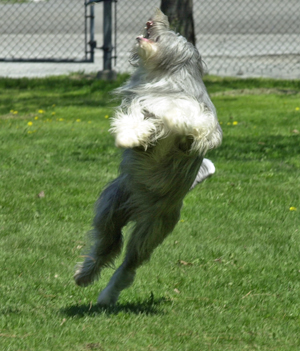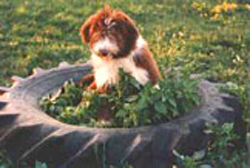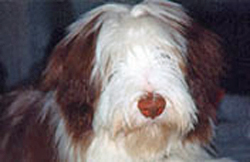
About the Bearded Collie

Full of life and possessing a heart of gold and a definite sense of humour, the Bearded Collie, or Beardie, makes friends wherever he goes. For many people the Beardie's medium size and amiable personality make them seem like the perfect family pet, but there is much more to consider before deciding to welcome a Beardie into your life.
First and foremost, although many devotees like to think of their Beardies as almost human, they are dogs and, surprise surprise, they do dog things. If, when you look at a baby Beardie, a cute innocent looking bundle of fuzz, you think he seems so angelic and beautiful that surely he will be the perfect low maintenance dog who will grow up to be a well behaved adult simply because you want him to, THINK AGAIN! If you fell in love with a beautifully behaved adult you saw, talk to the owner about what it took to get to that point. It most certainly didn't happen by itself. Beardie puppies will dig, bark, jump up on you (muddy paws and all), chew things, steal food off the counter, and do all sorts of other normal dog behaviours. Unless taught otherwise they will grow up to be adults who do all the same things. After all, no one told them it was unacceptable.
The breed originated in Scotland as a tireless sheep herder, bred to work long hours and to think for himself how best to get the job done. Transferring this to a home environment you have an energetic companion who is always ready to play, and who may or may not obey commands depending on whether or not he deems them justified! Because of this stubbornness and unwillingness to obey without question, some have called Beardies stupid. In fact they are anything but! In many cases where a Beardie did not work out in a particular, chances are the Beardie was smarter than its owner! Thinking again to their heritage, the Beardie who was blindly obedient would be useless at his job.

Even the most seasoned show or obedience dogs, trained to perfection and as well mannered as you could imagine, still have a day or two every so often where they just feel like being silly! These days usually coincide with the owner having invited a group of important people along hoping to impress them with the results of their hard work. A Beardie will always keep you humble! If you can't smile at the mischievous antics of a Beardie even when you were hoping for perfection, then a Beardie is not the dog for you.
Beardies are very intelligent, and are quick to learn as long as the teaching is fun, consistent, and fair. Harsh treatment has no place in the training of this loving and sensitive breed. They can also be master manipulators, extremely adept at getting their own way! One of the hardest parts of owning a Beardie is taking care not to inadvertently teach him the wrong things. If you don't stay mentally one step ahead of your Beardie, your Beardie will do a very good job of training you! A young Beardie can often be likened to a 2 year old child - tending to respond to every request with 'No!', just to see if he can get away with it. If you let him you will eventually end up with about 50 lbs of shaggy dog who 'won't walk on a leash' or 'doesn't like to be brushed', simply because when he was younger he learned that throwing a tantrum will get him out of doing anything that you want him to do. Even in properly raised pups this behaviour often resurfaces around adolescence - the 'teenage stage' when they start feeling rather full of themselves and decide to test to see just who's in charge.
To bring a Beardie into your home is to gain a new companion in your life. A Beardie needs daily attention and interaction with his owners to feel he is part of the family. An extremely social breed, they do not do well as outside or kennel dogs, isolated from their people and deprived of companionship for long periods of time. Energetic and enthusiastic, a Beardie will need some form of regular daily exercise to keep him healthy and happy, but they are not hyper dogs. If you're a very active sort of person a Beardie will happily join in whatever you have planned, and will keep going as long as you do, but Beardies are very adaptable to their living situation so they can be just as content with regular walks through the neighbourhood.

The most important thing is to do SOMETHING with them, and to do it together. Regular mental and physical stimulation is the key to a well adjusted pet. Without it he will become bored and frustrated, and left to his own devices a Beardie will come up with his own games to keep his mind and body occupied, games that will not likely be appreciated by his owners!
One of the more obvious issues to consider when thinking of getting a Beardie is coat care. Beardies have long coats which require regular brushing - generally about an hour a week for adults, and considerably more during the transition stage from puppy to adult coat which occurs around 1 year of age. It is possible for the coat to be kept clipped short, and it is not unusual for this to be done to older Beardies, or by owners who are heavily involved in activities with their Beardie, but if your initial reaction to the sight of a Beardie in full coat is 'I don't have time to deal with that coat, but I'll get a Beardie anyway and just keep it shaved down', then perhaps a shorthaired breed would be better suited to you.
The breed is generally a very healthy one, with a life span of about 12 to 14 years, and ages up to 15, 16, or older are not uncommon. Disorders such as hip dysplasia that plague some other breeds have been kept to a minimum in Beardies due to their medium size and weight, and x-raying of breeding stock by responsible breeders. Food sensitivities or allergies seem to be a problem for some Beardies.

Sound sensitivity is also common in the breed, usually manifesting itself as a fear of thunder or large trucks. Extreme fear reactions to even mild noises should warrant a trip to the vet as it may be a symptom of a medical problem such as hypothyroidism. Autoimmune disorder, an increasing concern in all dogs, are seen occasionally in Beardie. Research on these diseases and how to prevent them is ongoing, but it is thought the manifestation of the disease may be a combination of genetic and environmental factors.
Choosing a breed is not something to be taken lightly. Acquiring a dog on a whim only to discard it when it is realized that the breed is totally unsuited to you causes unhappiness all around and only adds to the statistics of unwanted pets. First decide exactly what you want and expect in a canine companion; take the time to research different breeds; attend dog shows to see a variety of breeds and talk to the owners about them; talk to and visit reputable breeders to ask questions and see what a breed is like in a home environment; and only then make a final decision about which breed is right for you. Both you and your dog will be glad you did.
Copyright © 1997, 2009, 2023 [Diane Wynen]. All rights reserved
Copyright © Bearded Collie Club of Canada 1997 - 2023.
All rights reserved.